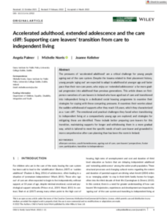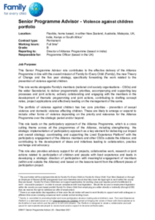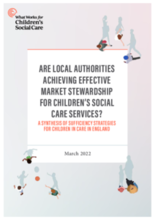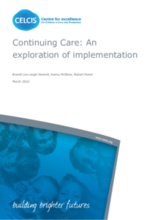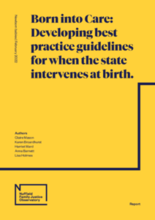Displaying 191 - 200 of 1185
A major plan containing 80 actions to improve the lives of children, young people and families in and around the edges of care in Scotland has been published. The ‘Keeping The Promise Implementation Plan’ aims to significantly reduce the number of children in care, with at least £500 million over this Parliamentary term to help families stay together.
In New South Wales, as of June 2021, 42% of children in out-of-home care were Aboriginal and Torres Strait Islander children.
This is a market study conducted by the Competition and Markets Authority (CMA) into children's social care provision in the UK. The study found that there is a shortage of appropriate places in children’s homes and with foster carers, meaning that some children are not getting the right care from their placement. Some children are also being placed too far away from where they previously lived or in placements that require them to be separated from their siblings.The authors recommend the development of national and regional bodies to support local authorities with getting suitable placements for children in the UK.
UK practitioners find the impact they have on people's wellbeing most rewarding but are struggling with administrative burdens, inadequate staffing and workloads, finds first annual British Association of Social Workers (BASW) membership survey.
This article draws on first-person narratives of care leavers in Ireland who have aged out of care and transitioned into independent living in a dedicated social housing programme to examine their strategies for coping with these competing pressures.
Salary:
GBP £50-55,000 equivalent - fixed in local currency. Salary will be determined based on experience and adjusted to the local market rate.
This report provides analysis of all up-to-date LA sufficiency strategies with a focus on identifying (I) the main perceived challenges for local authorities (LAs) to meet their sufficiency duty, (II) what actions are being undertaken or planned by LAs to improve commissioning outcomes, and (III) perceived negative consequences associated with using certain commissioning or market shaping approaches. This work was commissioned by the Independent Review of Children’s Social Care.
This research aims to identify and better understand what it is that enables and challenges the necessary improvements needed at national and local level to support children and young people to successfully transition to adulthood.
Separating a baby from his or her mother at birth when there are safeguarding concerns is traumatic for birth parents and painful for professionals. This report presents findings from a study that analysed qualitative data from the lived experiences of parents and professionals where the state intervened at birth. The aim was to identify key challenges and to surface good practice examples with a view to developing a draft set of best practice guidelines for piloting with partner research sites in England and Wales.
Increased support for care leavers and new legislation to reduce out of area placements must also be introduced as part of a major reform of the children's social care system, according to a report by the All-Party Parliamentary Group (APPG) for looked-after children and care leavers. The report, which reveals the results of a spotlight inquiry on the care system, will feed into the upcoming Care Review.


